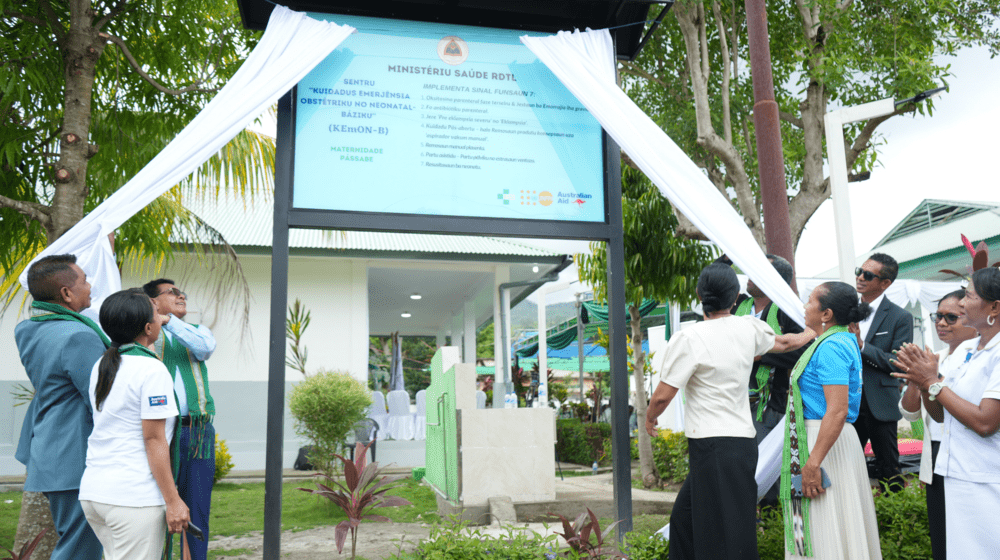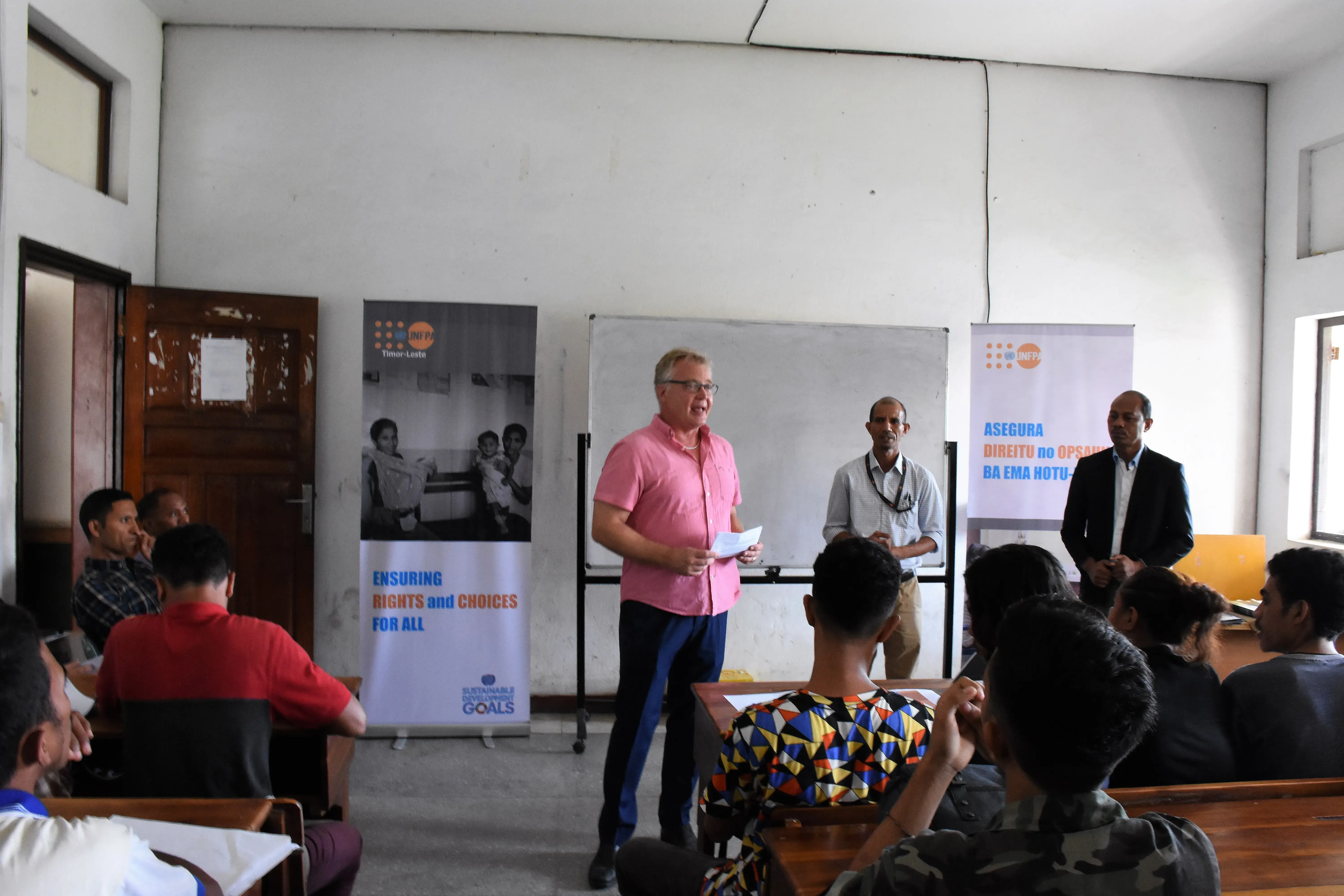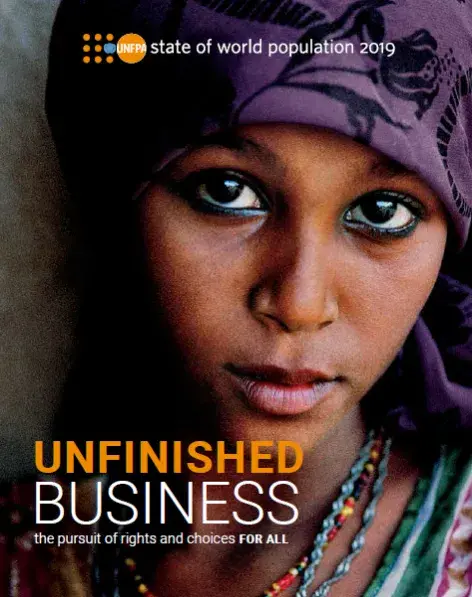Timor-Leste Vice-Minister for Institutional Strengthening in Health Inaugurates the BEmONC Centre Pássabe to Safeguard Maternal and Newborn Health
RAEOA, 12 December, 2024 – The inauguration of the Maternity Unit Community Health Center Pássabe as a Basic Emergency Obstetric and Newborn Care (BEmONC) Centre marks a significant milestone in safeguarding the health of mothers and babies in Timor-Leste. The facility is arranged and set to meet the high-quality of standards to deliver the seven signal functions of BEmONC with functional infrastructure, trained healthcare providers and essential medical and non-medical equipment and supplies, life-saving drugs, mothers and newborns in Timor-Leste have newfound reasons to hope for safer deliveries with the provision of quality care, particularly for the dignity and rights of the mothers.
Despite commendable progress in maternal health, over 50% of mothers in the country still deliver at home, putting their lives and their babies at considerable risk. Additionally, the shortage of skilled birth attendants during pregnancy and childbirth remains a key challenge in reducing Timor-Leste's high maternal and infant mortality rates, currently at 195 per 100,000 live births for maternal mortality and 30 per 1,000 live births for infant mortality.
During the inaugural ceremony of the 6th Basic Emergency Obstetric and Newborn Care (BEmONC) Centre in RAEOA, Vice-Minister José dos Reis Magno expressed deep concern over the high maternal mortality and morbidity rates in Timor-Leste. He reaffirmed the government’s commitment to addressing these challenges in collaboration with strategic partners.
“Despite a notable reduction in the Maternal Mortality Rate, as indicated in the 2016 Demographic Health Survey of Timor-Leste, it remains distressingly high compared to other Southeast Asian nations. Our dedication to decreasing maternal and neonatal mortality is evident in the National Strategic Development Plan and the National Health Sector Strategy Plan 2011–2030,” said the Vice-Minister. He also emphasized the government’s close partnership with development agencies through the Ministry of Health to align efforts with the Sustainable Development Goals (SDGs).
Dr. Domingas Bernardo, Assistant Country Representative for UNFPA Timor-Leste, highlighted the importance of strengthening the existing EmONC programme. “UNFPA, in close collaboration with the Ministry of Health and the National Institute of Public Health, continues to build the capacity of health personnel nationwide on EmONC. We also provide essential medical and non-medical equipment to ensure healthcare providers can apply their acquired knowledge and skills. By doing so, we contribute to our goal of zero preventable maternal deaths,” stated Dr. Bernardo. All BEMONC center is equipped and set to deliver integrated SRH/FP/HIV/STI and GBV services
She further noted, the Basic Emergency Obstetric and Newborn Care (BEmONC) Centre Pássabe is the 6th certified BEmONC centers supported by Government of Australia and UNICEF for immediate newborn life-saving equipment and in addition with the a significant funding support of the Government of Japan, 20 maternities will be upgraded and certified as BEMONC centers by 2025 and 2026.”
The Passabe Basic Emergency Obstetric and Newborn Care (BEmONC) Center is a beacon of hope for the remote community it serves, particularly for pregnant women and their babies. Situated on the border with Indonesia, this center has transformed maternal and newborn care in the region. Previously, health personnel faced immense challenges when referring complicated cases to the Regional Hospital in RAEOA due to poor road conditions, especially during the rainy season. Tragically, some lives were lost during these difficult transfers.
Now elevated to a BEmONC-level facility, the Passabe Health Center empowers healthcare providers to manage the seven essential functions of obstetric and newborn care on-site, significantly reducing the need for hospital referrals except for surgeries or blood transfusions. This advancement brings renewed hope and improved outcomes for the community, ensuring safer pregnancies and deliveries even in this remote area.
The inauguration event was attended by high-level officials, including the Secretary General of Health of RAEOA, the Secretary Regional of Land and Property of RAEOA, the Director General of Primary Health Care and Quality Control of the Ministry of Health, the President of the National Public Health Institute, the Head of the Pássabe Post Administrative Office, representatives from DFAT and UNICEF, as well as local authorities, civil society organizations, healthcare providers, Church, and community members.




